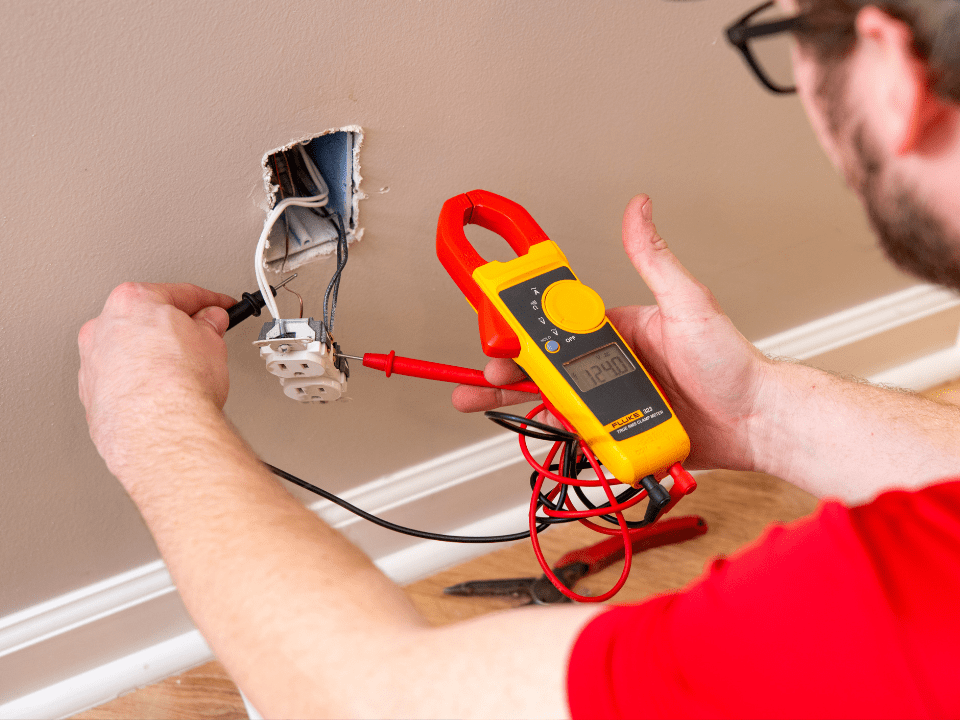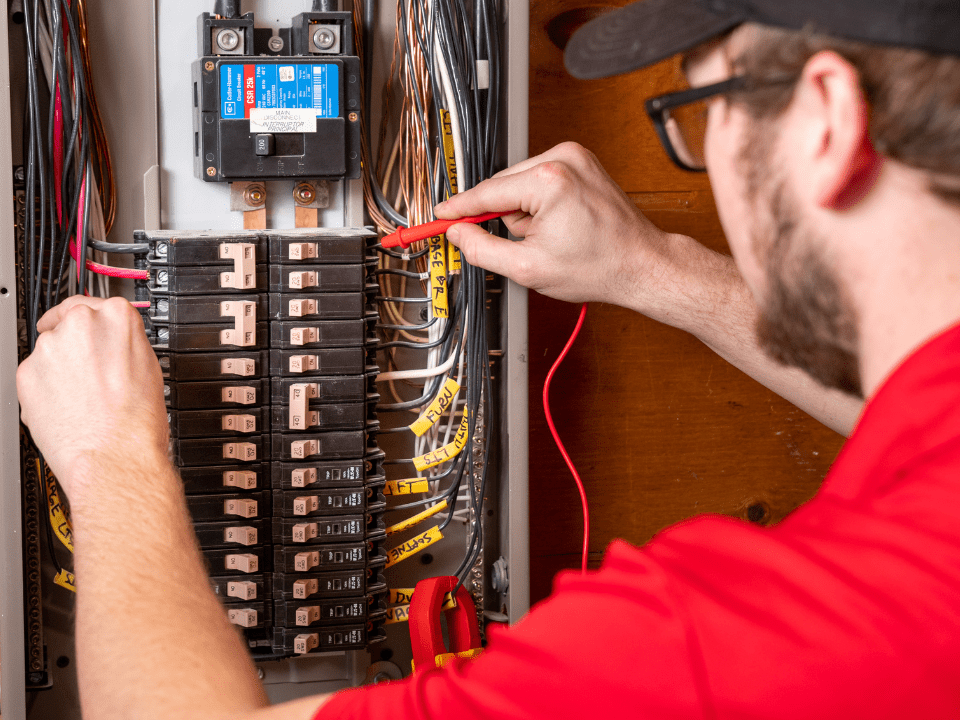We are here when you need us!
Do You Need an Electrician in Columbus, IN?
In every home in Columbus, a modern electrical system powers various appliances effortlessly throughout the day, often without much thought. But when issues arise, and the electrical system struggles to meet the household’s needs, our experienced team at Mister Quik is ready to assist. Our skilled electricians in Columbus have dealt with a variety of electrical challenges and know what it takes to keep your home’s electrical system working smoothly and efficiently. The best part is, there’s always an electrician nearby whenever you need one. Contact us today for reliable electrical services provided by the best local electricians in Columbus, IN.


5 Signs You Need an Electrician
If you’re experiencing electrical issues in your Columbus home, it’s crucial to pay attention to certain signs that indicate you may need the expertise of a professional Columbus electrician. Here are 5 signs that it’s time to call in an expert for your electrical repair needs:
- Flickering Lights: If your lights are constantly flickering or dimming, it could be a sign of an underlying electrical issue. An experienced electrician in Columbus can identify and fix the problem promptly.
- Frequent Circuit Breaker Trips: Electrical panels play a crucial role in distributing power throughout your home. If your circuit breaker frequently trips, it might be time for an electrical panel upgrade service.
- Strange Smells or Sounds: Unusual odors or buzzing sounds coming from outlets or electrical fixtures should not be ignored. These could be indicative of faulty wiring, requiring the attention of a skilled Columbus electrician.
- Outlets Not Functioning: Non-functional outlets can be a sign of various issues, from faulty wiring to overloaded circuits. An electrician in Columbus, Indiana can diagnose the problem and provide a reliable solution.
- Aging Wiring: If your home is equipped with outdated wiring, it may pose safety hazards. Consider consulting an electrical contractor in Columbus for a thorough inspection and, if necessary, a rewire house service.
Remember, timely intervention by a qualified electrician in Columbus, IN can prevent minor issues from escalating into major problems. Don’t hesitate to seek professional help for any electrical concerns in your home.
How Do I Identify Electrical Problems in My Home?
Identifying electrical problems in your home involves a systematic approach to understanding and troubleshooting potential issues. Here are some technical steps you can take:
- Check Circuit Breakers: Examine the circuit breaker panel for tripped breakers. A tripped breaker indicates an overload or short circuit in the corresponding circuit. Resetting the breaker may resolve the issue.
- Inspect Outlets and Switches: Perform a visual inspection of outlets and switches for signs of discoloration, scorch marks, or unusual heat. These could indicate wiring issues or overloading.
- Review Utility Bills: Unexpected increases in utility bills could be a sign of inefficient or malfunctioning electrical appliances. Energy monitoring devices can help identify power-hungry devices.
If you encounter complex issues, or if you are unsure about the diagnosis and solutions, consulting with a licensed electrician or an electrical professional may be necessary for a more in-depth assessment.


What Causes Circuit Breakers to Keep Tripping?
Circuit breakers trip when there’s an electrical overload or a fault in the circuit. Here are more specifics about what would cause this to happen:
- Overloaded Circuits: If a circuit is drawing more current than it’s designed for, the breaker trips to prevent overheating. This could result from plugging too many devices into the same circuit or using appliances that draw high currents.
- Short Circuits: A short circuit occurs when the hot wire (live wire) comes in direct contact with the neutral wire. This causes a sudden surge in current, triggering the circuit breaker to trip as a safety measure.
- Appliance Issues: Malfunctioning appliances with internal electrical problems can cause circuit breakers to trip. It may be due to a faulty motor, damaged wiring, or other issues within the appliance.
- Faulty Circuit Breaker: In some cases, the circuit breaker itself may be faulty. It could trip prematurely or fail to trip when necessary. Replacing a malfunctioning circuit breaker is a technical solution to address this issue.
Remember, when it comes to electrical repairs, especially those involving circuit breaker repairs, prioritizing safety and seeking professional help is key. Don’t hesitate to reach out to a trusted residential electrician in Columbus for a thorough inspection.
What Should I Do in Case of an Electrical Emergency?
Power Outage:
- Check Circuit Breakers: Inspect your electrical panel for tripped circuit breakers. Reset any tripped breakers and identify the cause of the overload.
- Contact Utility Company: If the power outage is not isolated to your home, contact your utility company to report the issue.
Burning Smell from Outlets or Appliances:
- Shut Off Power: If you notice a burning smell, shut off power to the affected circuit or appliance immediately.
- Inspect for Damage: Investigate the source of the smell, looking for damaged wiring or appliances. Replace or repair components as needed.
Lightning Strike:
- Unplug Electronics: Unplug electronic devices during a lightning storm to prevent damage from power surges.
- Install Surge Protectors: Use surge protectors to safeguard sensitive equipment and appliances.
- Grounding: Ensure your electrical system is properly grounded to minimize the risk of lightning-related damage.
What Are the Common Causes of Outlet Issues?
- Loose Wiring: Loose or damaged wiring within the outlet or electrical box can lead to intermittent power supply or complete failure. Check for loose connections and tighten them, ensuring secure electrical contact. Or call a local Columbus Electrician Near You.
- Overloaded Circuits: Overloading a circuit by connecting too many devices to a single outlet can cause issues. Each circuit has a maximum load capacity, and exceeding it can lead to overheating. Distribute electrical devices across multiple outlets or install additional circuits if needed.
- Burnt Outlets: Overheating due to loose connections or overloaded circuits can cause outlets to burn out. Inspect outlets for discoloration or burning marks, and replace any damaged outlets promptly.
- Voltage Fluctuations: Sudden changes in voltage, such as power surges, can damage outlets. Consider installing surge protectors to safeguard outlets and connected devices.
- Aging Wiring System: In older homes, outdated wiring systems may contribute to outlet issues. Consider upgrading to modern wiring standards to improve safety and reliability.
By understanding these technical aspects, you can better identify common outlet issues and, in some cases, implement solutions on your own. However, if the problems persist or if you are unqualified in dealing with electrical components, consulting a qualified electrician is necessary.






